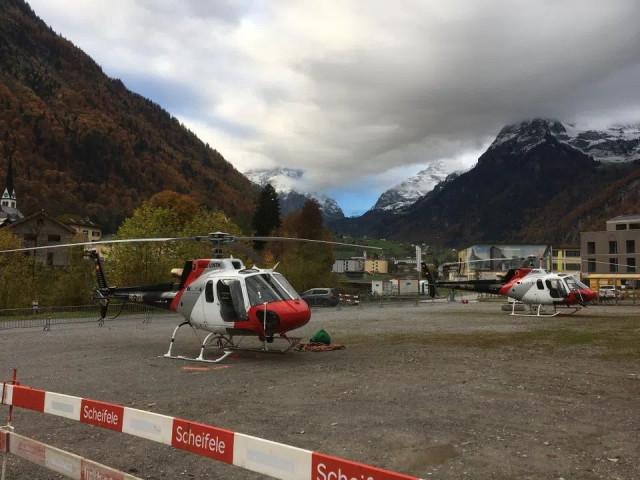Infrastructure Development: the Importance of Public Transportation for the Livability of Remote Areas
Written by Marina Girod & Emil Fingal, students of the University of Zurich
This November, a curious story appeared in the Swiss newspaper SRF. In a municipality called Braunwald, located in the highlands of canton Glarus and only accessible by a funicular railway, a rail-replacing helicopter will be introduced for the upcoming two weeks while maintenance work is conducted on the funicular railway (Glarnerland, 2023; SRF, 2023). But why is a helicopter ride the proposed transportation solution, when it is so costly (up to 100'000 CHF) (SRF, 2023)? Many people might suggest rail-replacement buses, as it is a usual practice in Switzerland when maintenance work on train tracks is due. Although this would be less costly, there is one issue with the municipality of Braunwald that makes it impossible: the municipality is part of the GaST (Gemeinschaft autofreier Schweizer Tourismusorte = community of car-free Swiss tourism destinations), a community of municipalities independent of cars (Braunwald im Glarnerland, 2023; Gemeinschaft autofreier Schweizer Tourismusorte, 2013). Furthermore, there is no road connecting Braunwald to the valley, only a narrow hiking trail infeasible for everyday commute. Naturally, when the operator of the railway announced the maintenance work, an alternative had to be found. By legal obligation in Switzerland (Personenbeförderungsgesetz), every village with more than 100 residents must have access to public transportation (Fedlex, 2023) and since there are no roads to Braunwald, one must take to the sky. At a cost equivalent to the funicular ticket (7.20 CHF), helicopter rides were available for two weeks for both residents and tourists, with priority given to workers and residents (SRF, 2023).
This unique situation shows the importance of having a law in place constituting infrastructure development and providing public transportation systems (PTSs) even to the most remote places in Switzerland. Without it, the residents of Braunwald would have been cut off from the valley for two weeks, making life increasingly difficult. Even though two weeks without public transport would be tough, it would likely be manageable. It is however a different story if the funicular had been shut down for good. Working in the valley would be close to impossible due to the long and harsh commute, limiting jobs to Braunwald. All jobs revolving around tourism would likely cease to exist, as most tourists arrive using public transportation. In fact, efficient public transportation has proven to be a driver of tourism in the Alps (Cavallaro & Dianin, 2020, p. 2). On top of that, Braunwald would need to support itself through its agriculture but with a limited goods influx facilitating efficient food production, this would be very challenging. The difficulties arising are almost countless but to sum it up, Braunwald would become unlivable if no major changes to its existing infrastructure were to be made. Eventually, the residents of Braunwald would be left with no other choice than to leave the village, leading to the depopulation of the municipality. Looking at the depopulation of the Georgian mountain municipality Oni, the similarities of the fictitious case of Braunwald become evident. Oni has experienced a steep decline in population due to its remoteness, poor infrastructure, and relying too heavily on certain economic sectors (Kohler et al., 2017, p.4). This short comparison should serve as a reminder of how important it is to invest appropriately in infrastructure.
Literature:
Braunwald im Glarnerland. 2023. Braunwald Autofrei. Retrieved 21.11.2023 from https://braunwald.ch/de/braunwald/autofrei.html
Cavallaro, F., & Dianin, A. 2020. Cross-border public transport as a driver for tourism in the Alps. Transportation Research Procedia, 48, 2446-2461.
Fedlex: Die Publikationsplattform des Bundesrechts. 2023. Bundesgesetz über die Personenbeförderung. Retrieved 25.11.2023 from https://www.fedlex.admin.ch/eli/cc/2009/680/de
Gemeinschaft autofreier Schweizer Tourismusorte. 2013. Retrieved 22.11.2023 from https://www.auto-frei.ch/index.php/de/quialitaet
Glarnerland. 2023. Braunwald Standseilbahn AG: Ihr Anschluss nach Braunwald. Retrieved 22.11.2023 from https://glarnerland.ch/de/map/detail/braunwald-standseilbahn-ag-0b116a0d-60d2-405c-844b-cbba3faf23e0.html
Kohler, T., Elizbarashvili, N., Meladze, G., Svanadze, D., & Meessen, H. 2017. The demogeographic crisis in Racha, Georgia: Depopulation in the central Caucasus mountains. Mountain Research and Development, 37(4), 415-424.
SRF. 2023. Bahnunterbruch in Braunwald: Heliflüge locken Touristen an: «Begrenzte Kapazität». Retrieved 20.11.2023 from https://www.srf.ch/news/schweiz/bahnunterbruch-in-braunwald-helifluege-locken-touristen-an-begrenzte-kapazitaet
Related Posts
Comments
By accepting you will be accessing a service provided by a third-party external to https://www.mountainapp.net/
This website uses no external trackers, no analytics, just session cookies and values your online privacy.



